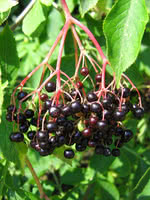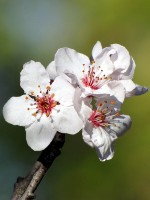Mon-Fri 9am - 5pm Mountain time
Western Sand Cherry vs Black Elderberry
Sambucus canadensis
Prunus pumila var besseyi
NOT AVAILABLE THIS SEASON - MIGHT RETURN
NOT AVAILABLE THIS SEASON - MIGHT RETURN
Black Elderberry is a deciduous shrub native to eastern North America. You can plant this shrub in moist areas and it will help stabilize your soil. You can also use it on rural properties anywhere you'd use a lilac.
Black Elderberries are considered to be partially self-pollinating. So while they will still produce some berries without cross-pollination, planting with another variety will increase yields. Consider planting with Ranch Elderberry or Bob Gordon Elderberry.
Warning: the seeds, stems, leaves, roots, and uncooked berries of the Black Elderberry are poisonous to humans when eaten in quantity. You should cook the berries to make them safe for human consumption.
Western Sand Cherry is known for its unique, leathery grey-green foliage and beautiful white blossoms. It is a popular ornamental shrub in parks and front yards. Both you and the wildlife will love its edible small dark red to purple cherries.
Due to its small stature and spreading qualities, Western Sandcherry is suitable as an underplanting or groundcover.
Many people graft plum and cherry varieties to Western Sand Cherry and use it as rootstock. It is also popular to graft hardy apricots to.
Black Elderberry Quick Facts
Western Sand Cherry Quick Facts
Toxicity: leaves, stems, and uncooked berries are poisonous to humans

